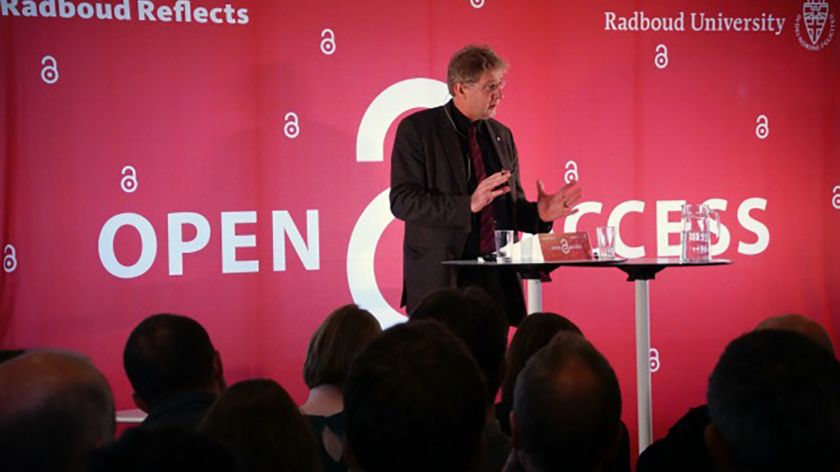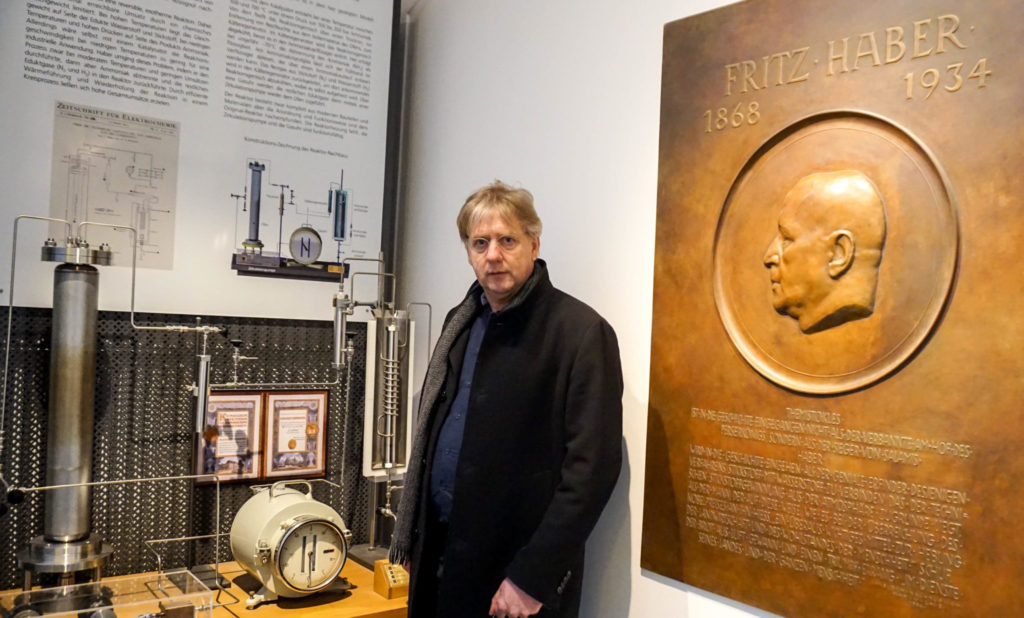‘Open access publication more expensive? Complete nonsense’
-
 Toenmalig collegvoorzitter Gerard Meijer hield in 2015 een lezing over open access, bij Radboud Reflects (RR). Foto: RR
Toenmalig collegvoorzitter Gerard Meijer hield in 2015 een lezing over open access, bij Radboud Reflects (RR). Foto: RR
It seems that as of 2020 we will all be able to read scientific articles for free. From Berlin, Former Executive Board President Gerard Meijer watches as European research councils force a breakthrough towards open access. ‘Money talks.’
When Gerard Meijer was still President of the Nijmegen Executive Board, he engaged on behalf of the Dutch universities in negotiations with large publishing companies, like Elsevier, on making open access possible. Although the negotiations were often fraught with difficulty, Meijer had no doubts about the chosen path. “Open access is the future,” he told VOX in 2015. “The question is not whether it will happen, but when.”
Now, three years later, Meijer is the new Director of the Max Planck Institute in Berlin. He is once again involved in negotiations on open access with the large publishers, this time on behalf of his new employer.
Freely accessible
What he sees is that a lot of scientific literature is still behind lock and key. Universities continue to spend millions on publisher subscriptions to give their students and staff access to journals. This has to change, according to eleven national European research councils, including the Dutch research council NWO. This week they published their joint plan.
A plan that states that open access will become the standard publication model. From now on, anyone who wants funding for their research will be required to publish their findings in an open access journal. In short: scientific knowledge will become freely available to all. Publishers will no longer earn their keep from subscriptions but from the fees authors have to pay to publish an article in their journals.

Gerard Meijer is excited about the research councils’ new plan. “In the negotiations I carried out with Elsevier in the Netherlands, I noticed how important it is that politicians exert pressure on the publishers.” Ultimately, Meijer believes that ‘money talks’. “Which is why it’s so crucial that research councils take this step now.”
Germany
Surprisingly enough, the German national research council is not part of the coalition of national research councils, even though open access is a hot topic in the country where Meijer works. Isn’t this strange, for a country that leads in the field of open access? “I’ve had many discussions about it with people here,” says Meijer. “The Germans believe that forcing researchers to publish in open access journals limits their freedom.”
‘The system would be twice as expensive. That’s just fiddling with figures.’
Another argument of principle that, in Meijer’s opinion, stands in the way of the solution (open access). “I don’t see the problem. What the research councils are now saying is: Do you want our cash? Then you have to meet certain criteria, which include open access publication. If you have any problems with it, you shouldn’t apply for funding.”
Research budget
According to Meijer, embracing open access will dramatically change the ‘financial dynamics’ within universities. A university library like the one in Nijmegen still spends millions on subscriptions, while authors who already publish in open access have had to finance this from their own research budget. In future, these financial resources will have to be bundled to pay publishers for publishing research results in open access.
“But that doesn’t make the new system more expensive,” says Meijer. “Despite what some people claim.” It disturbs him greatly that a Wageningen researcher was allowed to freely fiddle with figures in De Volkskrant. “He claimed the new system would be twice as expensive. Let’s base the discussion on facts.”
Meijer takes out his calculator. It was calculated that the current academic publication system costs € 7.6 million a year. We also know that 1.8 to 1.9 million articles are published every year, but let’s round this up to 2 million for the sake of ease. This boils down to a minimum of € 3800 per article in the current publication system. “In our negotiations with the large publishers, € 2000 was the amount considered acceptable for an open access article. How does this make open access more expensive? It’s complete nonsense.”



